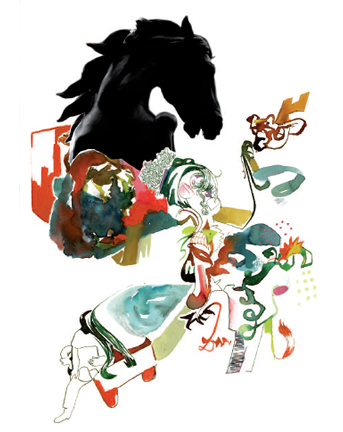The function of theatre
is to return to the public
the responsibility for moral argumentation.
Howard Barker
Astonishing, out of place, disconcerting: Howard Barker, the “barker” of English theatre (Mike Sens), is not someone that leaves himself much open to being discussed, and that is a very good thing. The only match for his creative freedom is the freedom he says he wishes to leave with, or return to, his audience, for his aim is “to address the soul precisely where it hears its own difference.” For Barker the distinctive aim of the theatre is above all not to show us what the world is, nor to correct that world. Nor is it to permit us to escape from that world by amusing us, or to reconcile us with it. No message, no compensation, no consolation; no didacticism, no entertainment. For Barker art is an irritant. Free from any censorship, he opens himself to “thought which is not authorized,” and to “the unconscious which has been abolished.” Far from solving problems he revives those we believed had been solved, he raises those the existence of which we hadn’t suspected. And he does so in a language the equivalent of no other – harsh, urgent, superbly unpredictable, with a bitter, colourful vivacity which makes him one of the great poets writing in contemporary English. Under the effect of this convulsive theatre the logic of the real and that of dreams are superimposed on each other or interfere with each other, time rushes forward or is suspended, eras telescope.
Barker’s work, which presently extends to almost sixty plays, is filled with lavish inventiveness: putting on four plays is hardly excessive in an effort to suggest the diversity of this work. Gusts of irony or lyricism sweep through the dialogues without warning, riddling a scene with their impact, where nothing is certain and no one is safe. Barker calls this the Theatre of Catastrophe; it is a theatre where Tragedy has impressively returned. A theatre which primarily, directly through the bodies of the actors and actresses, uses processes which are so many questions addressed to reality, at the risk of subverting our comfortable, complacent certainties and inflicting on us “this subtle harm caused to a well-constructed life.” A theatre which demands of its public that it become the subject of an acute experiment, at times painful or difficult (but what experiment worthy of the name is not?), in which the actors are the lab assistants: the experiment of poetry. For “it is only through poetry can one make melancholy bearable, and only the poetic actor can accompany the spectator in his pain. This pain is a necessity. The Theatre of Catastrophe is not solace from a cruel world, but the world’s cruelty made manifest, to appear as – beauty.”


